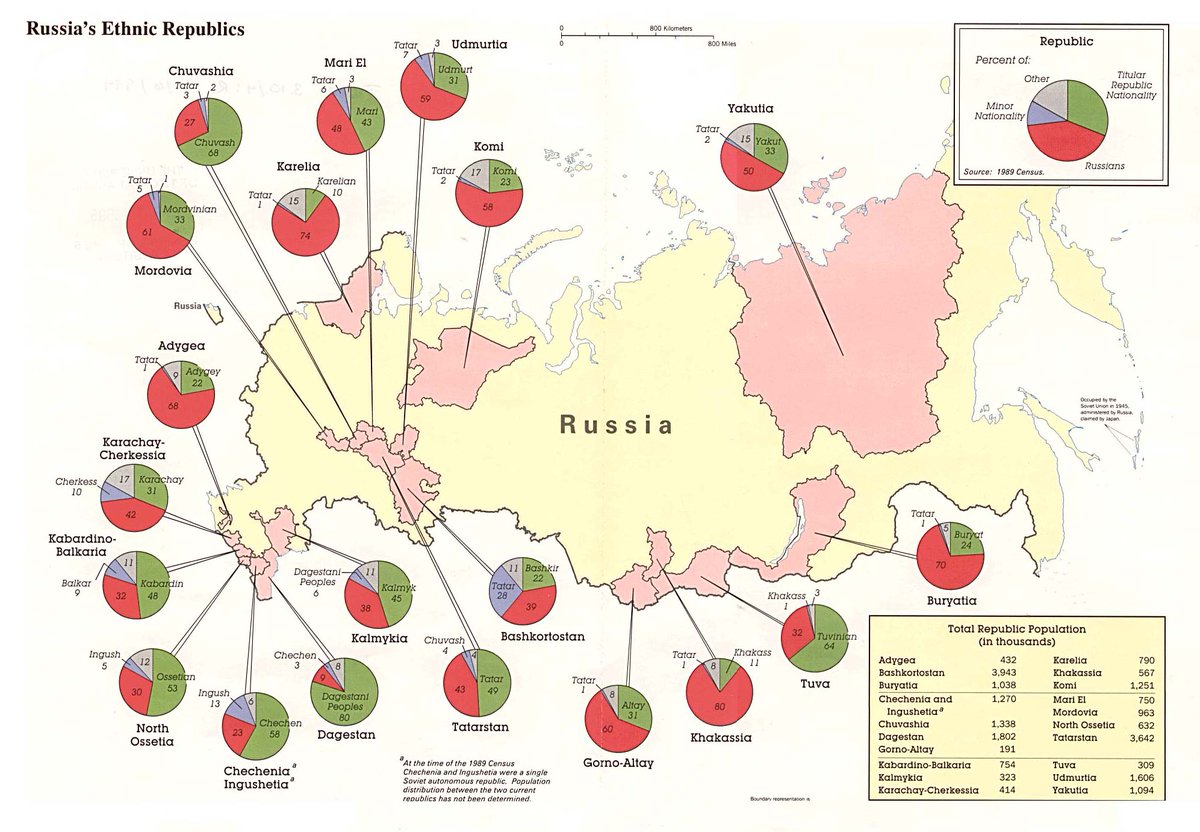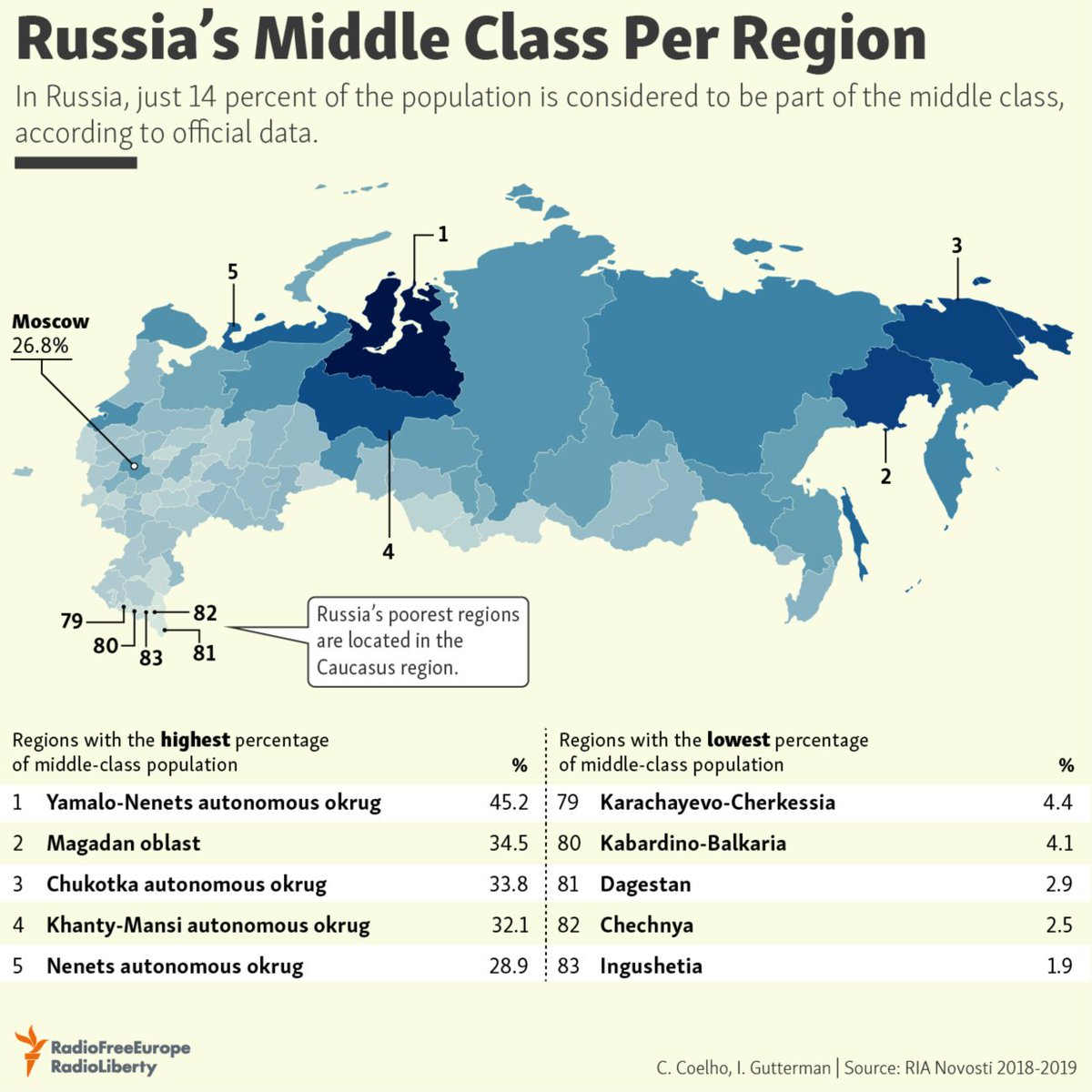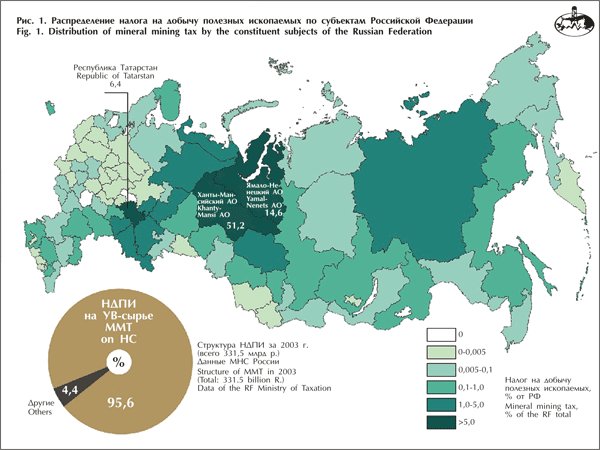On the fate of Russia and a way out of the war(s), Part 2
Part 1 recap:
The best course of action is to not save Russia’s face but to rip it off entirely, as it is nothing more than a mask, a mask of neoclassical chauvinistic colonial imperialism.
Part 1 recap:
The best course of action is to not save Russia’s face but to rip it off entirely, as it is nothing more than a mask, a mask of neoclassical chauvinistic colonial imperialism.
https://twitter.com/MuKappa/status/1533944022997286912?s=20&t=BzqR2Y9_glcc4CQ6THT9TQ
In the previous part, I conclude that Russia is a colonial empire in its foreign policy and internal political structure. I already discussed the aggressive foreign policy of the current regime. 

However, contemporary Russia's outward colonial aggressiveness predates the current regime. Think of the war in Transnistria 1990-1992, where Russia took an active part. theconversation.com/4-things-to-kn…
Or the 1999 Pristina airport incident, where the Russians took the airport ahead of the British troops, thereby hampering the allied NATO effort and assisting the Serbian side. Russia and NATO were an inch away from going kinetic. theguardian.com/world/1999/jun…
Russia's interest in Moldova and the Balkans goes back to the 19th century, as the region at large was a point of contact between three empires: the Russians, the Ottomans, and the Austro-Hungarians. staff.lib.msu.edu/sowards/balkan… 

And contemporary Russia still clings to its 19th-century colonial/imperial interests in the Balkans, though the other two imperial adversaries are long gone, highlighting its ongoing old-fashioned imperialist nature. carnegieendowment.org/2019/02/06/rus… 

Why is that? Because after WWI the Russian Empire had never died. It was reborn as the USSR. The empire no longer had a tsar, but all power was still centralized at the imperial court in Moscow. Here is a primer on the history of the USSR from the LOC: loc.gov/exhibits/archi… 

The decolonization process of the Russian Empire (under all labels) started in 1991, driven by a multitude of factors ranging from the Western economic pressure to the political opportunism of the elites. bbc.co.uk/news/magazine-…
However, decolonization was not completed. I already discussed ethnic Russian exceptionalism deeply rooted in the Russian collective psyche. Combined with revanchism, many Russians believe in their right to restore their colonial possessions. 

The current president of Russia said as much himself recently (for the billionth time). He's not a madman, but simply plays into the populist beliefs of many Russians, he is a product of the Russian imperial system.
https://twitter.com/IAPonomarenko/status/1534902769638944772?s=20&t=3UbnJJlasSSopiLwRLNzlA
In part 1 I also conclude that the only way to put an end to Russia's colonial ambitions is to break apart the empire in its present form, the Federation. I propose two tools for decolonization: economic incentives and collective guilt. Let's discuss economics first.
I will oversimply many things. Many academic studies were conducted on the colonial economics of the European Empires. However, I am under the impression that Russian colonialism is underexplored. Nonetheless, most colonial economies share an extractive trait. 

This means that land and available resources are exploited for the benefit of the metropole center without investing much into the local economic development of the colony. The resources are then used to produce finished goods or are simply reexported from the imperial heartland. 

Starting with the basics: the population of the Federation is unevenly distributed. I will ignore demographic trends for simplicity and will only look at the recent snapshots. Here's population density: 

This distribution lines up with the picture at large of the population distribution of the Federation. Note the border of the orange and red sectors is the rough location of the Ural mountains. What's happening in the Transurals? Let's look at more maps. 

Here is GDP per capita by region. Note, that Moscow is the only relatively wealthy "region" in the Central Federal District (roughly the green sector in the maps above). 

Why don't people move from the less wealthy part of European Russia into the Urals and Transurals? In fact, it seems the opposite happens. Why? The GDP per capita figures by region do not reflect disposable income and the living conditions in the regions. rg.ru/2021/10/14/ros…
Life in the regions presents few to no opportunities, bad public services, bad ecology, overall low quality of life, etc. "The best is in Moscow" is probably the best phrase that describes the situation the author of the article below uses.
journal.tinkoff.ru/migration-plan…
journal.tinkoff.ru/migration-plan…
What is driving the high GDP per capita in some of the regions of the Urals and Transurals? Natural resources. The Russian Federation is nothing more than a classical colonial empire extracting rents from the land and resources of the colonies. Here's a map of nat. gas reserves. 

Tax revenues overall going into the federal budget are also dominated by the colonies, if the metropole, Moscow, and the old metropole, St. Petersburg, are excluded. Almost 80% of all tax revenues is coming from the colonies. delovoymir.biz/analitiki-nazv…
At least a third of the Russian Federal budget is coming from hydrocarbons (the upper estimate is 51%). This is troubling... for Moscow.
rbc.ru/economics/22/0…
rbc.ru/economics/22/0…
These revenues from hydrocarbons cannot be coming forever. As the existing deposits deplete, extracting oil and gas from unexploited reserves is simply too costly. NB: this is yet another reason why the Russians started to look for new colonial possessions
chathamhouse.org/sites/default/…
chathamhouse.org/sites/default/…

Alright, so we've established the colonies, regions of the federation, are being exploited for their resources. But do they get anything in return? Not really, look at the population distribution of the empire. What of industrialization? Let's look at more maps: 

Unsurprisingly, both Moscow and St. Petersburg areas are heavily industrialized. What's happening in and around Ufa and Surgut? Ufa and the neighboring cities are dominated by oil and gas and mining-related industries. To save on logistics some upstream factories are not far too. 

Surgut and the rough area on other hand are purely extractive. The region produces 42% of all Russian oil and AO Surgutneftegaz is the largest enterprise. All other industries are tied into the oil and gas sector (logistics, etc.). Source (VPN required): budget.minpromtorg.gov.ru/citizens/post/… 

Another good example is how the Russian shipbuilding industry is spread out. Here you can see that the colonies are not trusted with this industry of high strategic value. 

What of the overall level of industrialization of the federation? Russia is industrialized, relatively, even more so than some of the western countries as the map below shows - manufacturing value added as % of GDP, share of GDP contributed by the manufacturign sector. 

There is a caveat. As the Chatham House says: Russian "manufacturing is not competitive on global markets" and is destined for domestic use. It is part of Russia's industrial sovereignty policy. The technological gap between Russia and the West is not new: jstor.org/stable/2600488… 

That's why western sanctions hurt the Russian economy so much. Everything from mining to the very top of the production chain suffers - it is a colonial empire merely focused on colonial exploitation. A full embargo would break the empire.
politico.eu/article/the-il…
politico.eu/article/the-il…
The colonies on the other hand stand to win quite a bit financially, with sufficient foreign investment (and other conditions). If for some reason a colony gains sovereignty it'll gain political agency *and* financial profits. The economic truth is being hidden.
The Kremlin/Moscow continues a decades-long narrative of "a benevolent metropole." For example, this article from Feb. 2021 highlights that in 2020 distributions from the federal center to the regions were record high:
iz.ru/1126723/iuliia…
iz.ru/1126723/iuliia…
Or this article from 2017, outlining how Moscow, St. Petersburg, "hydrocarbon" regions, and Tatarstan "feed" the rest of the country: realnoevremya.ru/articles/67340…
My thinking of Moscow being a classical imperial metropole is also supported by the Russians. Viktor Suslov, a Russian economics professor and member of the Russian Academy of Sciences, voiced some concerns about the imbalance in the federal economy. kommersant.ru/doc/4154938
In his interview with Kommersant, he said: “The worst “parasite” on Russia’s body is the Central Federal District [Moscow]. Its “contributions” to the target indicators of all federal districts appear to be negative,...
...and at that, the “result” of its “interaction” with the Northwestern district is a reduction in the target indicators of the latter by almost a quarter.” 

He adds: "The current situation is a consequence of disproportionate and unfairly high revenues, that are primarily received by Moscow. Financial resources are artificially drawn into the federal center from the entire country." 

In his 2019 interview, however, Suslov doesn't predict that the federation would dissolve for economic reasons. He postulates that "the cultural and historical foundations of Russia's unity" are too strong.
Note, that he was on the same research team that found no economic reasons for the Soviet Union's collapse. ieie.su/persons/suslov…
This brings us to the ethnic minorities and their republics point. I disagree with Suslov's last point. The autonomous republics point is very obvious and has nothing to do with economics, that's why this is the only time I'll bring them up. They are obvious colonies. 

So to sum up:
- Moscow and St. Petersburg are imperial centers
- Regions are exploited for their resources as colonies
- Decolonization would be a financial win for the colonies
- Decolonization must start with the dissolution of the federation, colonies are too lucrative
- Moscow and St. Petersburg are imperial centers
- Regions are exploited for their resources as colonies
- Decolonization would be a financial win for the colonies
- Decolonization must start with the dissolution of the federation, colonies are too lucrative
Colonies are too lucrative to grant them agency. The imperial centers stand to lose too much in a real federalization of the empire and even a liberal parliamentary government wouldn't risk upsetting the Muscovites. rbth.com/lifestyle/3273…
In part 3 on the fate of Russia, I will discuss collective guilt as part of the decolonization process. For now, it is worth noting that trust in institutions in Russia is extremely low. The results are corroborated by research: jstor.org/stable/2775230…
themoscowtimes.com/2019/01/22/rus…
themoscowtimes.com/2019/01/22/rus…
Social trust (trust in a stranger to do no harm) is also low in RU. Dupont and Karpoff posit that trust is formed by a triad of laws, reputation, and culture. With the dissolution of the empire, proper laws granting agency to the people can be introduced.
link.springer.com/article/10.100…
link.springer.com/article/10.100…
However, reputation and culture will have a long road ahead where the construct of collective guilt will play a critical role.
End of thread.
End of thread.
• • •
Missing some Tweet in this thread? You can try to
force a refresh















